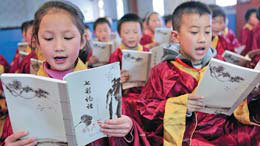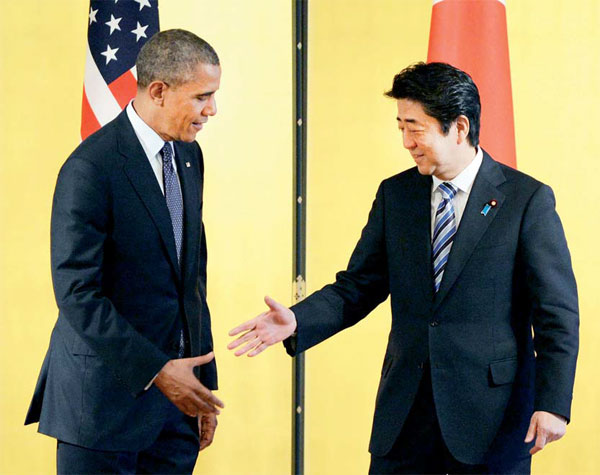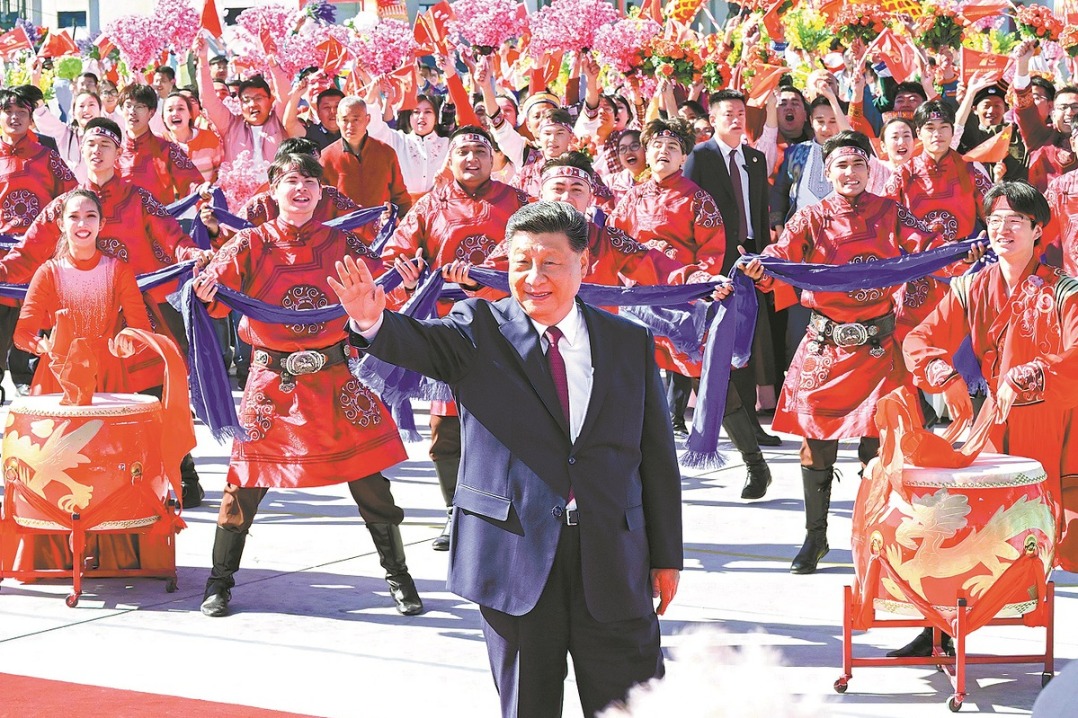What's news

| Japan's Prime Minister Shinzo Abe welcomes US President Barack Obama at the Akasaka Palace in Tokyo on April 24. Toru Yamanaka / Pool / Reuters |
Obama criticized for Diaoyu Islands remarks
Beijing is adamantly opposed to the Diaoyu Islands being placed under the US-Japan defense treaty, a Foreign Ministry spokesman said on April 23.
His comments came after US President Barack Obama, in a rare public statement ahead of his visit to Tokyo, committed US forces to back Japan in the event of a conflict over China's Diaoyu Islands.
In a written interview published April 23 by Japan's leading newspaper Yomiuri Shimbun, Obama said the islands "fall within the scope of Article 5 of the US-Japan Treaty of Mutual Cooperation and Security".
"And we oppose any unilateral attempts to undermine Japan's administration of these islands," Obama said.
Spokesman Qin Gang said the Foreign Ministry "firmly opposes" actions that place the Diaoyu Islands under the cover of the US-Japan treaty and urged Washington to "speak and act cautiously".
"The US-Japan alliance is a bilateral arrangement formulated during the Cold War era, which should not infringe on China's territorial sovereignty and lawful rights and interests," Qin said.
Qin added that China's determination and will to safeguard territorial integrity, sovereignty and maritime interests is unshakable.
The US president made the comments just before he started his visit to Japan on April 23, the first stop of his four-nation East Asia tour.
Pact to reduce sea conflicts
More than 20 countries from the Pacific region unanimously approved a landmark maritime agreement on April 22 to reduce the chances of miscommunication or the potential for situations to arise that could lead to conflict in busy sea lanes.
The Code For Unplanned Encounters at Sea was passed at the Western Pacific Naval Symposium, a biennial meeting that opened in Qingdao, Shandong province. A tactical maneuvering and signal manual was agreed on to govern the conduct of warships and aircraft from signatory countries that unexpectedly come close at sea.
Observers said the non-binding document marked a substantial move to increase maritime communication and safety and signaled the Chinese navy's determination to strengthen cooperation with its counterparts.
Calling the code "a milestone document" in the symposium's history, Wu Shengli, commander of the Chinese navy, urged participants to take this opportunity to encourage frontline forces in the air and at sea to develop effective and efficient communication channels and procedures.
"We need to respect history and take history as a mirror and continue to resolve maritime disputes and conflicts through peaceful means as well as avoid extreme behavior that may endanger regional security and stability," he said.
APEC fuels renewed interest in English
Beijing appears ready to fuel a fresh wave of interest in English-language learning in the run-up to the Asia-Pacific Economic Cooperation meeting this fall.
"Compared with many international metropolises, the popularization of English is not as strong in Beijing," said Chen Mingming, a foreign language expert at the Ministry of Foreign Affairs.
"The government should come up with more platforms and channels to facilitate language learning and better receive guests from across the globe during the APEC meeting."
Chen made the remarks at an event in Beijing that included the launch of an English handbook, online classes and education platforms on the popular WeChat smartphone application.
The APEC meeting is expected to generate renewed interest in learning English, mirroring a similar craze in anticipation of the Beijing Olympics in 2008, he said.
Draft law to widen scope of lawsuits
More social organizations would be entitled to file lawsuits against accused polluters if the latest draft amendment to the Environmental Protection Law is adopted by the top legislature.
The fourth draft amendment to the law was submitted to the National People's Congress Standing Committee for review on April 21.
In the previous draft, only social organizations that have registered with the central government could file public interest lawsuits for possible environmental violations. The latest draft, however, will allow organizations that meet three specific requirements: they must have been registered with prefecture-level governments over the previous five years, they must prove they have worked to protect the environment for more than five years, and they must have a good reputation.
Experts said it means the number of organizations eligible to file such lawsuits would increase from a few dozen to more than 300.
The current Environmental Protection Law was enacted in 1989. The revision of that law, which began in August 2012, has taken almost two years.
Plan for more nuclear plants
The central government is quickening its approvals for nuclear energy and will launch projects in coastal areas to ensure energy security and economic growth, according to the State Energy Commission.
In a statement released on April 20, the commission said it discussed strategic problems in the development of the energy resources industry as well as some major projects.
The launch of new projects will resume at the proper time and will adopt the highest international safety standards, according to the commission, which met on April 18.
The latest approvals of nuclear plants and other energy projects are part of the government's plan to push economic growth without resorting to large-scale stimulus measures.
As the fastest-growing atomic energy nation, China will launch another 800 gigawatts of capacity for nuclear power this year, according to the National Energy Administration.
Reading becomes a social activity

More Chinese are settling down with a good book than ever before, albeit across a variety of platforms, and reading is becoming an increasingly fashionable social activity, according to the Chinese Academy of Press and Publication, which published its 11th National Reading Survey on April 21.
The report, which surveyed more than 40,000 people in 74 cities last year, found that Chinese readers got through 8.8 billion books, 600 million more than in 2012. And it seems they still can't get enough.
According to CAPP, which estimates that the Chinese book market is worth 46 billion yuan ($7.3 billion) per year, the average Chinese reader consumed 7.25 books in 2013 - about one-third in digital format.
In addition, they each read 70 editions of a newspaper and five magazines, spending 50 minutes a day reading online and 35 minutes on physical publications.
Meanwhile, e-reading made a real impression for the first time, with 50 percent of readers endorsing the format in 2013. To put that growth into perspective, in 2012 every person in China read 6.74 books on average.
China Daily
(China Daily European Weekly 04/25/2014 page2)
Today's Top News
- New finding may rewrite human family tree
- China urges cooperation to boost global digital trade
- Beijing calls for stronger voice of justice
- China beefs up climate response with new 2035 targets
- Xinjiang marks seven decades of growth, unity
- Xinjiang's farm produce on global map






























